#that being the Aleph by Jorge Luis Borges
Text
this book is rewiring my brain
#that being the Aleph by Jorge Luis Borges#at first i was a bit bummed cuz he writes stories based on a lot of history and i know very little about it but THEN#i realized this worked to my advantage as well#even though they were harder to digest this way the punch was even stronger later#his way of writing allows not knowing a lot of history and still enjoying the stories#overall really good so far!!
12 notes
·
View notes
Text
Listen I tried starting the Bungo Stray Dogs manga like 7 years ago or smt, but I was falling out of the reading manga train so I have not read it or watched BUT I'm watching a guy react to it and it finally convince me to give it another shot.
That said what I made this post for was because them exploring more worldwide things in s5 made really want some latino autors like:
I want Carlos Fuentes, I want his gift to be "Aura" which allows him to bring people back from the death by summoning their soul into a living persons body, stealing it away.
I want Gabriel García Márquez, "Cien años de soledad" (one hundred years of solitude) being his gift would be the obvious choice, allowing him to capture people in a time prison or something could be cool but "El amor en los tiempos del colera" (love in the times of cholera) would be funny and "Crónica de una muerte anunciada" (chronicle of a death foretold) would be cool if we didn't already had 2 characters who could forsee their own death.
Jorge Luis Borges having "El Aleph" giving him a kind of omnipresence allowing his spirit to leave his body and percive from above and great distance.
Julio Cortazar havin "Rayuela" as his gift allowing him to chose between possible futures that things could have at the moment, I don´t know what Juan Rulfo's gift would be since I don't know how to make his most iconic work "Pedro Paramo" into a gift, Like forcing dead beat dads to take accountability? who knows, the possibilities are endless.
Just Latin American autors being anime boys you know.
(honorary mention to the autor of "Por amor a Feliciana" (For love of Feliciana) whom I actually met, he signed my book then I proceeded to lend it to someone I can't remember and they never returned, also my watercolour teacher bashed him when she saw me reading the book, because I think his gift would be the ability to teleport next to a person as long as he is horny enough for them)
#bsd#bungou stray dogs#bsd headcanons#???#idk what to call this#are they bsd ocs?#this just made me realize the lack of female latina authors I have read#the only book I can recall tight now with a female mexican author that I have read#is a mexican girl witha fantasy 4book saga that was a teen when she started writing#my sister met her sister#but she's not popular enough since I have never actually met another person who has heard or read her books#but her name is andrea dr lourd chapela saavedra#and ger powers would probably be a weird mix between Poe's and Kunikidas#i actually think that they are one of the most interesting concepts I have read#and wish more people knew them#but I will aknowledge that the writing might be lacking#I read them in elementary school#but I still think they deserve better in concept alone#but i digress
10 notes
·
View notes
Text
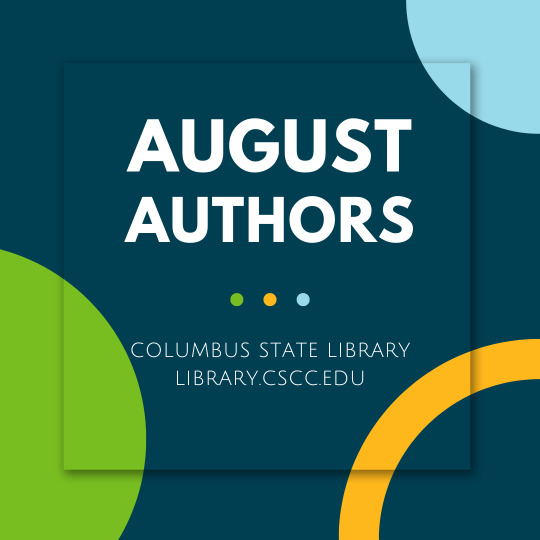
Some of the world's most beloved and influential authors were born in August! Click their names to find their work in our collection or via OhioLINK.
Herman Melville (August 1, 1819), fiction writer and poet. Notable works: Moby-Dick; or, The Whale, "Bartleby, the Scrivener," Billy Budd, Sailor (An Inside Narrative).
James Baldwin (August 2, 1924), writer and activist. Notable works: Go Tell It on the Mountain, "Sonny's Blues," Notes of a Native Son.
Percy Bysshe Shelley (August 4, 1792), poet, novelist, playwright, and husband of Mary Shelley. Notable works: "Ozymandias," "A Defense of Poetry," The Cenci.
Guy de Maupassant (August 5, 1850), author of the Naturalist school. Notable works: "The Necklace," "The Horla," Pierre and Jean.
Wendell Berry (August 5, 1934), farmer, environmental activist, writer, and winner of the National Humanities Medal. Notable works: The Unsettling of America, Citizenship Papers, "The Vacation."
Walter Dean Myers (August 12, 1937), author of children's and young adult literature. Notable works: Hoops, Monster, Fallen Angels.
William Maxwell (August 16, 1908), writer and long-time fiction editor at The New Yorker. Notable works: So Long, See You Tomorrow, The Heavenly Tenants.
Ray Bradbury (August 22, 1920), influential author of innumerable science-fiction short stories and novels, many adapted into other media. Notable works: Fahrenheit 451, Something Wicked This Way Comes, "The Veldt."
Dorothy Parker (August 22, 1893), poet, fiction writer, and satirist; member of the Algonquin Round Table. Notable works: Enough Rope, Death and Taxes, Laments for the Living.
Jorge Luis Borges (August 24, 1899), author and translator. Notable works: The Aleph and Other Stories, The Book of Imaginary Beings, "The Library of Babel."
Theodore Dreiser (August 27, 1871), journalist and author of Naturalist fiction. Notable works: Sister Carrie, An American Tragedy.
Mary Shelley (August 30, 1797), novelist and early author of science fiction. Notable works: Frankenstein; or, The Modern Prometheus, Mathilda.
Current Columbus State students and employees can check out items with their photo ID, or view ebooks using their Columbus State login and password. For help with research or finding items, contact our Reference department.
5 notes
·
View notes
Photo
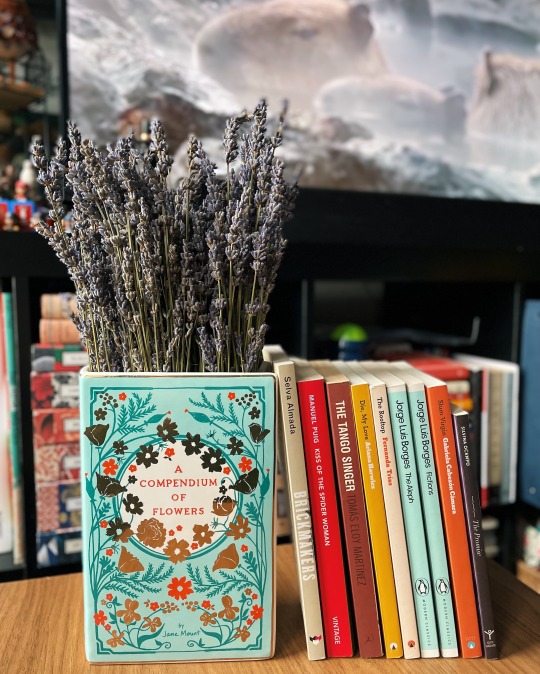
I bring a lot of books with me on vacation. Traveling solo brings a lot more downtime than when you travel with someone. My trip to Argentina includes a few plane rides (including the two big ones). My itinerary includes spending relaxing afternoons at pretty cafés or in stunning bookstores. And of course, nights or mornings in lovely airbnbs, enjoying coffee or a drink. A huge part of being able to travel solo is being able to have books as my companions.
I read a book every 2.5 days, and I will be away from home for 18 days—so mathematically, I need at least 7 books (yes, I do know ereaders exist, they’re just not for me). Once upon a time, any books would do. But now, I think quite a bit about which books to bring. My book stack for Argentina is all Argentinian, except for one Uruguayan author (I’ll be in Colonia de Sacramento as a day trip), and one author of a book about getting lost, which I fittingly forgot to include in this photo.
The list:
Brickmakers by Selva Almada, tr. Annie McDermott
Kiss of the Spider Woman by Manuel Puig, tr. Thomas Colchie
The Tango Singer by Tomás Eloy Martínez, tr. Anne McLean
Die, My Love by Ariana Harwicz, tr. Sarah Moses & Carolina Orloff
The Rooftop by Fernanda Trías, tr. Annie McDermott
Fictions and The Aleph by Jorge Luis Borges, tr. Andrew Hurley
Slum Virgin by Gabriela Cabezón Cámara, tr. Frances Riddle
The Promise by Silvina Ocampo, tr. Suzanne Jill Levine & Jessica Powell
I’m particularly looking forward to reading Borges, one of my favorite authors, in the winding streets of his city, and to read another book by Cámara. Good book-friends of mine might wonder why Mariana Enríquez isn’t on my reading list. The answer is simple: I’m not looking to freak myself out while reading late at night in a quiet, blustery Patagonian town...
#argentine literature#argentinian literature#selva almada#jorge luis borges#silvina ocampo#book stack#reading while wandering#reading while wandering argentina
30 notes
·
View notes
Note
do you have any book recommendations that go with the aesthetics of the toothsome tv universe?
hmm this is a great question! honestly i don’t read as much fiction as i used to so i don’t have a ton of recs.
i think house of leaves by mark z. danielewski is a no-brainer.
there are books associated with the the shows in the toothsome tv universe as well, chief among them being the secret diary of laura palmer and my life my tapes (dale cooper’s autobiography).
the king in yellow by robert w. chambers is somewhat inspirational of true detective (carcosa), but that’s more high cosmic horror.
i haven’t yet read the books the terror and sharp objects are based on (by dan simmons and gillian flynn respectively) but i’d bet they’d bear fruit!
i don’t know if i can recommend the thomas harris novels that hannibal is based on, but that is the source material (i’ve only read red dragon and it was alright)
but! i think grotesque stories are always worth it so:
perfume: story of a murderer by patrick süskind
rabbits by kanai mieko
anything by southern gothic queen flannery o'connor
i will have to think about your question more tho!
Edit: i should have added jorge luis borges’s works to this. his collection of short stories, particularly The Aleph and Other Stories is very much in this vein!
#ask#toothsome tv universe#the-heart-of-my-mystery#twin peaks#hannibal#true detective#sharp objects#the terror#yellowjackets#house of leaves#perfume: the story of a murderer#rabbits by kanai mieko#lit#i don’t think#story of the eye#should go here necessarily#but it is formative
21 notes
·
View notes
Text
List of books I read this year
Persuasion by Jane Austen
Red Dragon by Thomas Harris
A Streetcar Named Desire by Tennessee Williams
Little Women by Louisa May Alcott
Morirás Lejos by José Emilio Pacheco
Devotions by Mary Oliver
Imaginary Friend by Stephen Chbosky
Mrs. Dolloway by Virginia Woolf
The Scarlet Letter by Nathaniel Hawthorne
Collected Poems by Edna St. Vincent Millay
My Cousin Rachel by Daphne Du Maurier
Sputnik Sweetheart by Haruki Murakami
Twelve Moons by Mary Oliver
The Hunchback of Notre-Dame by Victor Hugo
At Swim-Two-Birds by Flann O’Brien
New Selected Poems 1966-1987 by Seamus Heaney
Ulysses by James Joyce
The Celtic Twilight: Faerie and Folklore by W. B. Yeats
Normal People by Sally Rooney
The Dark by John McGahern
The Yellow Wallpaper by Charlotte Perkins Gilman
Une sirène à Paris by Mathias Malzieu
Atonement by Ian McEwan
The Shipping News by Annie Proulx
After the Quake by Haruki Murakami
Far From the Madding Crowd by Thomas Hardy
Breakfast at Tiffany’s by Truman Capote
A Knight of the Seven Kingdoms by George R. R. Martin
The Silence of the Lambs by Thomas Harris
Leaves of Grass by Walt Whitman
A Room with a View by E. M. Forster
Les Fleurs du Mal by Charles Baudelaire
E. E. Cummings: Complete Poems 1904-1962 by E. E. Cummings
No me preguntes cómo pasa el tiempo: Poemas 1964-1968 by José Emilio Pacheco
Heart of Darkness by Joseph Conrad
War and Peace by Leo Tolstoy
Mrs. Caliban by Rachel Ingalls
The Importance of Being Earnest by Oscar Wilde
The Ballad of Songbirds and Snakes by Suzanne Collins
Beloved by Toni Morrison
After Dark by Haruki Murakami
The Collected Poems of W. B. Yeats by W. B. Yeats
The Collected Poems of Oscar Wilde by Oscar Wilde
Breath, Eyes, Memory of Edwidge Danticat
Marina by Carlos Ruiz Zafón
El Aleph by Jorge Luis Borges
Selected Poems by Marina Tsvetaeva
The Silent Patient by Alex Michaelides
Kiss Kiss by Roald Dahl
Alias Grace by Margaret Atwood
Adonis by Adonis
If Not, Winter by Sappho
Mexican Gothic by Silvia Moreno-García
The Trial by Franz Kafka
The Iliad by Homer
Collected Poems, 1909-1962 by T.S. Eliot
The Selected Poetry of Rainer Maria Rilke by Rainer Maria Rilke
The Odyssey by Homer
The Divine Comedy by Dante Alighieri
A Room of One’s Own by Virginia Woolf
Flowers for Algernon by Daniel Keyes
The Complete Poems of Emily Dickinson by Emily Dickinson
The Painted Bird by Jerzy Kosinski
Perfume: The Story of a Murderer by Patrick Süskind
Eleanor Oliphant is Completely Fine by Gail Honeyman
The Tattoist of Auschwitz by Heather Morris
Fire & Blood by George R.R. Martin
Arráncame la vida by Ángeles Mastretta
The Wonder by Emma Donoghue
32 Candles by Ernessa T. Carter
Blind Willow, Sleeping Woman by Haruki Murakami
Collected Poems, 1912-1944 by H.D.
I Capture the Castle by Dodie Smith
Hannibal by Thomas Harris
The Tell-Tale Heart and Other Writings by Edgar Allan Poe
The Legend of Sleepy Hollow by Washington Irving
The Shining by Stephen King
The Complete Poems by John Keats
The Monk by Matthew Gregory Lewis
The Birds and Other Stories by Daphne du Maurier
Fingersmith by Sarah Waters
Middlesex by Jeffrey Eugenides
Picnic at Hanging Rock by Joan Lindsay
The Hour of the Star by Clarice Lispector
La ciudad de vapor by Carlos Ruiz Zafón
The Collected Poems of Audre Lorde by Audre Lorde
Hiroshima by John Hersey
Selected Poems: 1965-1975 by Margaret Atwood
Selected Poems II: 1976-1986 by Margaret Atwood
Dearly: New Poems by Margaret Atwood
Uncollected Poems by Rainer Maria Rilke
My Dark Vanessa by Kate Elizabeth Russell
The Book of Disquiet by Fernando Pessoa
Circe by Madeline Miller
The Prophet by Kahlil Gibran
The End of Everything (Astrophysically Speaking) by Katie Mack
Before We Were Yours by Lisa Wingate
The Road by Cormac McCarthy
Poems: 1962-2012 by Louise Glück
Lady Windermere’s Fan by Oscar Wilde
You can follow me or add me as a friend on Goodreads.
120 notes
·
View notes
Note
Sasuke haters think we’re cringy for trying to point out Konoha’s mistakes and saying the massacre was wrong lmao they are like ‘it ain’t real bro u should be showing this much reaction to actual world problems’ and then go and worship naruto and write essays about how much sakura sucks and how that one time lee kicked sasuke’s ass also how they think we have problems with a fictional massacre but we just don’t care about real life massacres or racism is beyond me honestly
Ah, I honestly hate that type of argument, “Naruto is not real tho”, like -congratulations, Christopher Colombus, you discovered America.
That doesn’t mean I can’t see real issues reflected in that fictional piece -nor that I can’t enjoy it by doing the type of metas I like to read. They do know that many great works of fiction are inspired by both real-life events and other works of art, right?
For instance, there’s a marvellous petit story written by no other than Jorge Luis Borges (internationally known argentinian writer), called Emma Zunz in The Aleph (1941) - and if you haven’t read it -do so, it’s just a few pages long and is so incredible is still being studied to this day. I’ll leave a link here in english -but if you understand spanish, try to read it in that language. It became so famous that years later, argentinian writer Martin Kohan published Erik Grieg (1990), that tells the story of one of the secondary characters that Borges introduced (in the original, he didn’t even have a name, Kohan brilliantly took advantage of an ellipsis created by Borges to pay tribute to his work -don’t you just love literature?).
They love metas who give complexity to issues/notions/character that don’t have them to begin with, yet, when what is canonically presented as a well-layered issue reachs fans that enjoy picking it appart as to see the contents, they get mad and suddenly develop a superior complex over “not caring for fictional characters because they have a life” -analyzing is a wonderful thing, writing is a wonderful thing, and if people as Martin Kohan can do so and get away with it, why can't we? Let haters hate.
17 notes
·
View notes
Text
2020 in books

Twenty-twenty... a year full of tragedy and wreckage and surprisingly pleasant moments. Really makes you appreciate the present.
No one asked for this list, but this is what I read this year. Let me know if you’re curious about any of them and would like to know my opinion. Happy New Year, everyone. May this new year bring success, health and joy.
January - two books:
“The Aleph and Other Stories” by Jorge Luis Borges
“The Sappho History” by Margaret Reynolds
February - four books:
“Dreamers” by Yuyi Morales
“With a Little Help from My Friends” by John Lennon
“The Well of Loneliness” by Radclyffe Hall
“On Being Different: What It Means to Be a Homosexual” by Merle Miller
March - four books:
“Geopolitics” by Saul Bernard Cohen
“The Vegetarian” by Han Kang
“The Love and Lies of Rukhsana Ali” by Sabina Khan
“Catch and Kill” by Ronan Farrow
April - two books:
“Carry On” by Rainbow Rowell
“Wayward Son” by Rainbow Rowell
May - twenty-one books:
“Reflection” by Elizabeth Lim
“Venus in Retrograde” by Susan Lilley
“Cults Uncovered” by Emily G. Thompson
“Loki: The God Who Fell to Earth” by Daniel Kibblesmith
“Stories” by Katherine Mansfield
“The Secret History” by Donna Tartt
“The Silence of the Girls” by Pat Barker
“Unsolved Murders” by Emily G. Thompson
“Pan’s Labyrinth” by Guillermo del Toro
“Daytripper 1-10″ by Fabio Moon
“Happy and You Know It” by Laura Hankin
“Latin American Folktales” by John Bierhorst
June - nine books:
“Gender” by Meg-John Barker
“The Red Pyramid” by Rick Riordan
“The Lightning Thief” by Rick Riordan
“The Sea of Monsters” by Rick Riordan
“The Titan’s Curse” by Rick Riordan
“The Stockholm Octavo” by Karen Engelmann
“Poems” by Sappho
“The Library Book” by Susan Orlean
“The Manson Women and Me” by Nikki Meredith
July - five books:
“The New York Times Book of Crime” by Kevin Flynn
“Essential Thor, Vol. 3″ by Stan Lee
“The Paris Hours” by Alex George
“Why Be Happy When You Could Be Normal?” by Jeanette Winterson
“Erotic Poems” by E.E. Cummings
August - seven books:
“Oranges Are Not The Only Fruit” by Jeanette Winterson
“Crier’s War” by Nina Varela
“Autobiography in Red” by Anne Carson
“The Beauty in Breaking” by Michele Harper
“Sex and Lies” by Leila Slimani
“Black Chalk” by Christopher J. Yates
“Smoke Gets in Your Eyes” by Caitlin Doughty
September - five books:
“I Married My Best Friend to Shut My Parents Up” by Kodama Naoko
“Pretty Guardian Sailor Moon Vol. 1″ by Naoko Takeuchi
“Gold Dust Woman” by Stephen Davis
“Hurricane Child” by Kacen Callender
“Coraline” by Neil Gaiman
October - six books:
“Mythology” by Edith Hamilton
“The Pagan Book of Living and Dying” by Starhawk
“The Night of the Gun” by David Carr
“Interview with the Vampire” by Anne Rice
“Restaurant to Another World Vol. 1″ by Junpei Inuzuka
“Of Light and Darkness” by Shayne Leighton
November - six books:
“Beneath a Ruthless Sun” by Gilbert King
“Frankissstein” by Jeanette Winterson
“A Burning” by Megha Majumdar
“Dionysos: Exciter to Frenzy” by Vikki Bramshaw
“Norma Jean Baker of Troy” by Anne Carson
“In the Dream House” by Carmen Maria Machado
December - six books:
“The Virgin Suicides” by Jeffrey Eugenides
“The Penguin Book of Mermaids” by Cristina Bacchilega
“Thirst” by Mary Oliver
“Pretty Guardian Sailor Moon #2” by Naoki Takeuchi
“Dance in Classical Greece” by Alkis Raftis
“Howl and Other Poems” by Allen Ginsberg
#dark academia#academia#light academia#classic art#art#dark academia aesthetic#dark#book#books#aesthetic#reading#2020#what i read
38 notes
·
View notes
Note
What are your favorite books ?
Hi, here’s a small list,
These are prose only, it doesn’t include poetry books or science books but if you’re interested in either of them just let me know. I include two books per author only
The Suicide Club / Strange case of Dr Jekyll and Mr Hyde by Robert Louis Stevenson
Of love and shadows / The house of the spirits by Isabel Allende
Tear this heart / Women with big eyes by Ángeles Mastreta
The complete short stories / The picture of Dorian Gray by Oscar Wilde
Stories of Love, Madness, and Death / The feather pillow by Horacio Quiroga
Kafka on the shore / Sputnik sweetheart Murakami Haruki
The bluest eye / Beloved by Toni Morrison
The Book of Laughter and Forgetting / The unbearable lightness of being Milan Kundera
The bell jar / The Letters of Sylvia Plath I & II by Sylvia Plath
Exodus / Mila 18 by Leon Uris
Gone Girl / Dark places by Gillian Flynn
She came to stay / The second sex by Simone de Beauvoir
The aleph / The book of Sand by Jorge Luis Borges
Mrs Dalloway / Orlando by Virginia Wolf
The Sailor Who Fell from Grace with the Sea / Thirst for love Yukio Mishima
One hundred years of solitude / Chronicle of a death foretold by Gabriel García Márquez
In search of lost time Vol 1-7 by Marcel Proust
The setting sun / No longer Human by Osamu Dazai
Peter Camenzind / Steppenwolf Hermann Hesse
The plague / The Strange by Albert Camus
The Trouble With Being Born / On the heights of despair by Emil Cioran
Nausea / No exit by Jean Paul Sartre
Human all too Human / Thus spoke Zarathustra by Friedrich Nietzsche
#I started the list w quick readings btw#I tried to make it small but i hope you find some interesting book here (=#replies#sorry for the late!
31 notes
·
View notes
Text
“There is nothing very remarkable about being immortal; with the exception of mankind, all creatures are immortal, for they know nothing of death. What is divine, terrible, and incomprehensible is to know oneself immortal.”
- Jorge Luis Borges, The Aleph
118 notes
·
View notes
Text
“There is nothing very remarkable about being immortal; with the exception of mankind, all creatures are immortal, for they know nothing of death. What is divine, terrible, and incomprehensible is to know oneself immortal.”
—Jorge Luis Borges, The Aleph and Other Stories
#quotes i have on my wall#academia#dark academia#aesthetic#studyblr#study#literature#quotes#jorge luis borges#mine
94 notes
·
View notes
Text
Shit Borges
I used to be a bouncer at a night club in Heston Service Station. Every Saturday night we would get all the major execs from the paper company in Heston proper come down and have a small bacchanalian get together. They would have been really decadent if they had the money, but all they could afford was computer dusting gas- difluoroethane or tetrafluoroethane I believe. They would huff it by the large fibreglass statue we had in the centre of club, the one of Eric Hobsbaum that weeped Prosecco when you kicked it in the balls. One night, the very night I stopped being a bouncer coincidentally, one of the execs had started to damage the leftist historian’s pouch really rather severely in an attempt to get enough free alcohol to sell it to his mates. I had to ask him to pay for the statue or leave. It was then I discovered to my shock that this would be the last time they would be coming here, as the Heston branch was closing down, and all the jobs being moved to Bahrain. As I said it had probably not been wise to make these trips to the service station a regular thing, he blew air duster into my face, and something amazing happened. I realised I had found what the writer Jorge Luis Borges referred to as “The Aleph”, and Gottfried Wilhelm Liebnitz “The Monad” the discovery that reveals the true nature of the universe, and allows the user to experience all of existence at once. The computer cleaner I had Inhaled had allowed me to reach the god spot in my brain, and I at once experienced the entire life of every single one of my forebears from the first Protozoa in the primordial soup to my own father, who’s eyes I now saw through as he left me on my 5th birthday in the care of my sodium bicarbonate snorting mother. “Why?” I shouted, “why did you leave me?” But it was to late. He had already left, and I was on the floor of Heston services’ Waitrose, shitting into a bag of own brand vegetable crisps, having broken in there during my psychotic episode. A the police dragged me away to life imprisonment for my act of sacrilege, I received my last philosophical awakening: there is no life- only Jam.
4 notes
·
View notes
Text
Wavelength
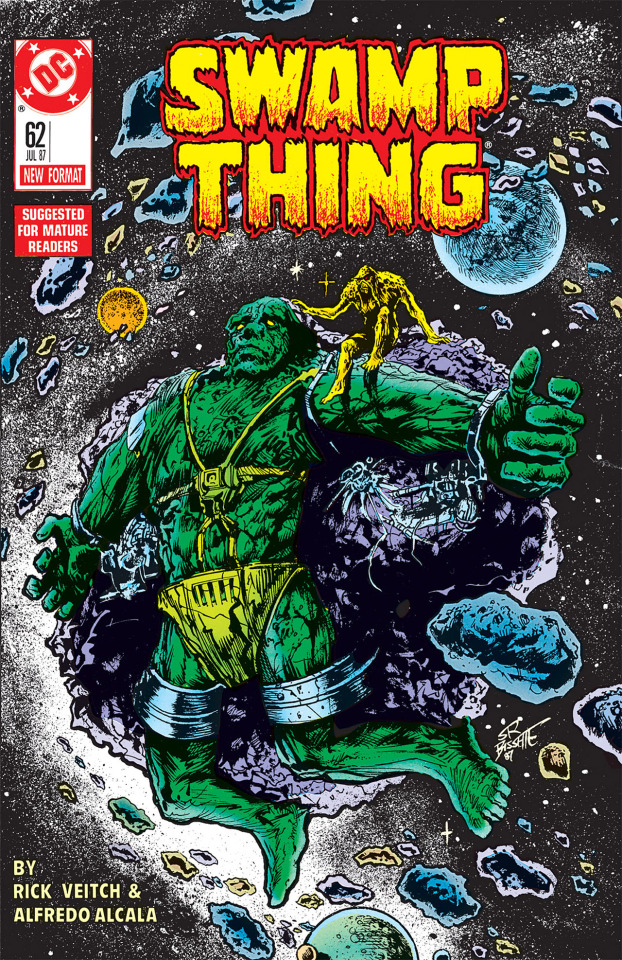
SWAMP THING #62
JULY 1987
BY RICK VEITCH, ALFREDO ALCALA AND TATJANA WOOD

SYNOPSIS (FROM DC DATABASE)
Near the Source Wall, Metron examines the plight of two giants who hoped to gain access to the Source by enlarging themselves. Suddenly, he hears a signal and follows it into the sleeve of one of the giants' spacesuits. Inside, he finds some interesting flora growing, but beyond that, he discovers a giant Mother Box. After shrinking it down to a manageable size, he sets a course for Highfather's staff.
Unfortunately, he finds himself immobile. His Mobius Chair's energy source was depleted by the shrinking process. Angrily, Metron kicks the Mother Box, which rendered his chair useless, away. However, he is surprised when that same Mother Box transmits the consciousness of the Swamp Thing there, and into the plant life which Metron had collected earlier.
Swamp Thing discovers the Mother Box, and believes that it has told him that he was brought there because Metron wishes to enter the Source. Metron responds that he merely wants to go to Apokolips. Swamp Thing states that no, Metron's destiny lies with the Source, and so does his own. With the help of the Motherbox he can transport Metron into the Source and back out again.

Swamp Thing alters his appearance into that of a chair, and uses the Mother Box to lift off, and fly toward the Source. He explains that having learned how to control his electromagnetic field, he can transcend the barrier by altering his vibrations.
After an uncomfortable transition through the barrier, they burst into the domain of the Transmuters – beings posted along the fringes of reality, working the compost of creation into higher matter. One of them notices them, and they are forced to escape before they are transmuted. Swamp Thing alters his vibrational pattern at the last second, bringing them past the final barrier. What the two of them see in the Source is too much for Swamp Thing to handle. Metron manages to focus on certain elements, seeing all of creation's marvels and follies.
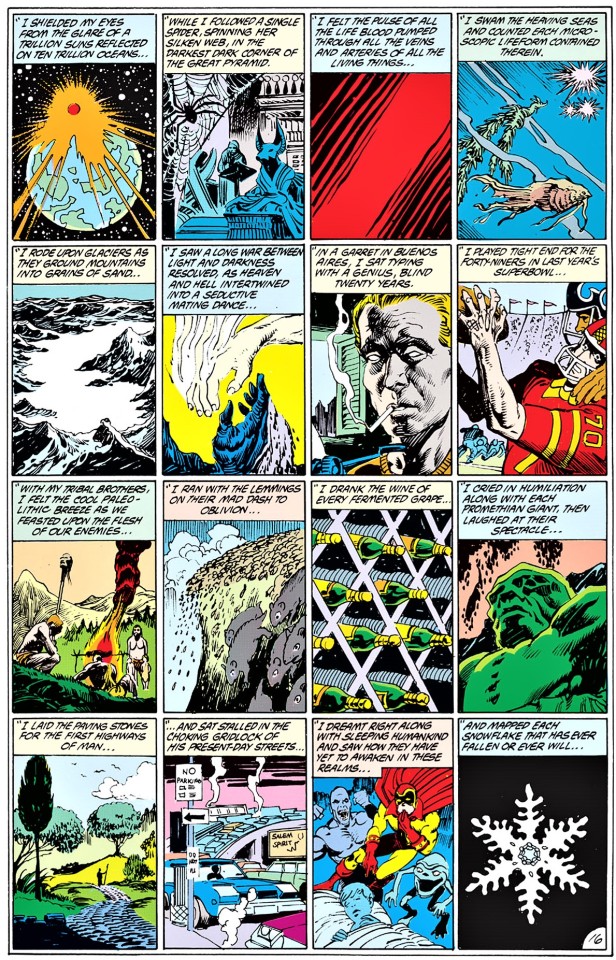
Metron recounts the tale to Darkseid, who laughs, revealing that what they had seen was not the Source, but an Aleph – a point from which one can view all other points in time and space. This information depresses Metron, as he'd hoped to barter the information gleaned from the source in exchange for X-Element, the fuel for his Mobius chair. Even so, Darkseid wonders if information about the Swamp Thing's nature could help him solve the Anti-Life Equation. Metron explains the Swamp Thing's nature, and notes that he has already left for earth.
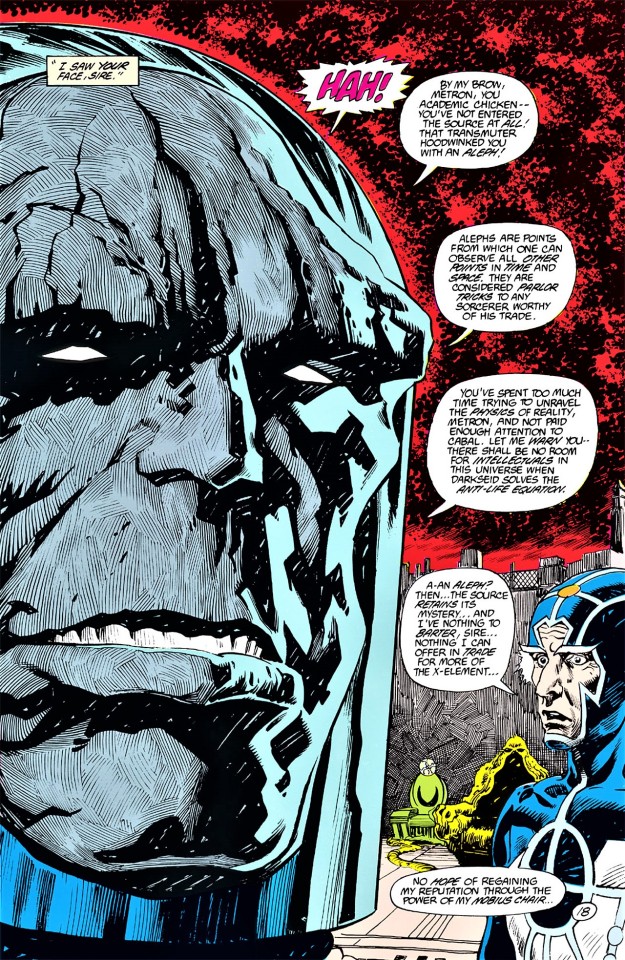
Metron reveals that the Mother Box had to remove most of Swamp Thing's memories of the Aleph. Darkseid asks to view the record of those memories. The record shows that Swamp Thing thought only of his wife, Abby. The moments he observed spread from past to future, but all ending in fire and death. The images drove Swamp Thing mad.
In exchange for the information, Darkseid offers Metron the X-Element, then, crushing the Mother Box in his fist, he curses that he had forgotten to add the element of love to his equation.
ALEPHS (FROM WIKIPEDIA)
Aleph or Alef (א), is the first letter of the Hebrew alphabet and the number 1 in Hebrew. Its esoteric meaning in Judaic Kabbalah, as denoted in the ancient theological treatise Bahir, relates to the origin of the universe, the "primordial one that contains all numbers." The aleph (ﺍ, or ʼalif) is also the first letter of the Arabic alphabet, as well as the Phoenician, Aramaic, and Syriac alphabets. Aleph is also the first letter of the Urdu and Persian alphabet, which are both written using Arabic script.
THE ALEPH, BY JORGE LUIS BORGES (ALSO WIKIPEDIA)
"The Aleph" is a short story by the Argentine writer and poet Jorge Luis Borges. First published in September 1945, it was reprinted in the short story collection, The Aleph and Other Stories, in 1949, and revised by the author in 1974.
In Borges' story, the Aleph is a point in space that contains all other points. Anyone who gazes into it can see everything in the universe from every angle simultaneously, without distortion, overlapping, or confusion. The story traces the theme of infinity found in several of Borges' other works, such as "The Book of Sand".
As in many of Borges' short stories, the protagonist is a fictionalized version of the author. At the beginning of the story, he is mourning the recent death of a woman whom he loved, named Beatriz Viterbo, and resolves to stop by the house of her family to pay his respects. Over time, he comes to know her first cousin, Carlos Argentino Daneri, a mediocre poet with a vastly exaggerated view of his own talent who has made it his lifelong quest to write an epic poem that describes every single location on the planet in excruciatingly fine detail.
Later in the story, a business on the same street attempts to tear down Daneri's house in the course of its expansion. Daneri becomes enraged, explaining to the narrator that he must keep the house in order to finish his poem, because the cellar contains an Aleph which he is using to write the poem. Though by now he believes Daneri to be quite insane, the narrator proposes without waiting for an answer to come to the house and see the Aleph for himself.
Left alone in the darkness of the cellar, the narrator begins to fear that Daneri is conspiring to kill him, and then he sees the Aleph for himself:
On the back part of the step, toward the right, I saw a small iridescent sphere of almost unbearable brilliance. At first I thought it was revolving; then I realised that this movement was an illusion created by the dizzying world it bounded. The Aleph's diameter was probably little more than an inch, but all space was there, actual and undiminished. Each thing (a mirror's face, let us say) was infinite things, since I distinctly saw it from every angle of the universe. I saw the teeming sea; I saw daybreak and nightfall; I saw the multitudes of America; I saw a silvery cobweb in the center of a black pyramid; I saw a splintered labyrinth (it was London); I saw, close up, unending eyes watching themselves in me as in a mirror; I saw all the mirrors on earth and none of them reflected me; I saw in a backyard of Soler Street the same tiles that thirty years before I'd seen in the entrance of a house in Fray Bentos; I saw bunches of grapes, snow, tobacco, lodes of metal, steam; I saw convex equatorial deserts and each one of their grains of sand...
Though staggered by the experience of seeing the Aleph, the narrator pretends to have seen nothing in order to get revenge on Daneri, whom he dislikes, by giving Daneri a reason to doubt his own sanity. The narrator tells Daneri that he has lived too long amongst the noise and bustle of the city and spent too much time in the dark and enclosed space of his cellar, and assures him that what he truly needs are the wide open spaces and fresh air of the countryside, and these will provide him the true peace of mind that he needs to complete his poem. He then takes his leave of Daneri and exits the house.
In a postscript to the story, Borges explains that Daneri's house was ultimately demolished, but that Daneri himself won second place for the Argentine National Prize for Literature. He also states his belief that the Aleph in Daneri's house was not the only one that exists, based on a report he has discovered, written by "Captain Burton" (Richard Francis Burton) when he was British consul in Brazil, describing the Mosque of Amr in Cairo, within which there is said to be a stone pillar that contains the entire universe; although this Aleph cannot be seen, it is said that those who put their ear to the pillar can hear a continuous hum that symbolises all the concurrent noises of the universe heard at any given time.
You can read it online.
REVIEW
So how did I know this was a reference to that short story? Well, Borges appears in this comic-book (I just updated the DC Database with this little fact). He is the blind writer in Buenos Aires.
The Alpeh allows us to take a look at recent events in the DCU and the Saga of the Swamp Thing as well, so it also works as a “greatest hits” issue. It also brings Darkseid closer to learning the anti-life equation. But in the end, if you skip this issue... well... you wouldn’t really miss much for the ongoing arc. It is a nice story though, and it is a good thing they didn’t reveal what’s behind the wall.
This is also Rick Veitch’s first solo issue of Swamp Thing.
I give this issue a score of 7
#steve bissette#dc comics#comics#review#1987#modern age#swamp thing#aleph#jorge luis borges#apokolips#darkseid#metron#source wall#new gods
3 notes
·
View notes
Photo
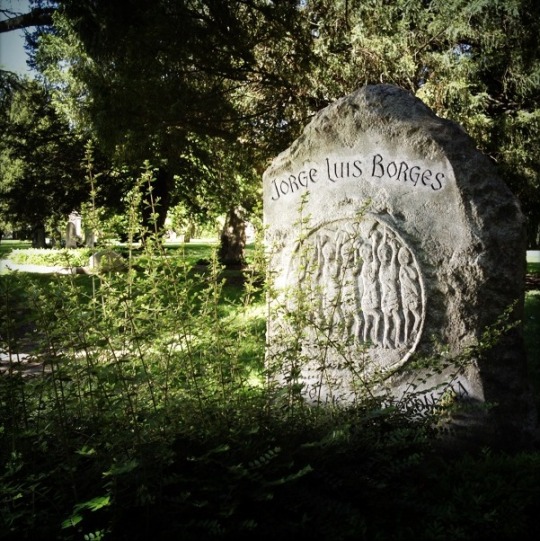
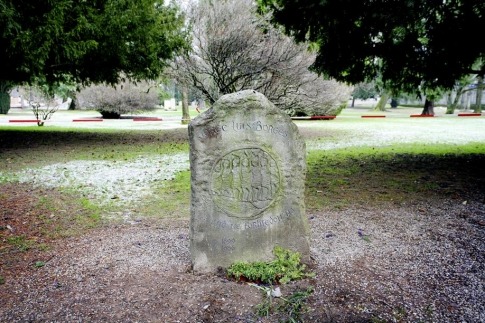
The Cimetière des Rois or Cimetière des Plainpalais, is a cemetery in Genève, Switzerland.
Writer's Phrases:
Only fools never change their minds.
When you reach my age, you will have lost your sight almost completely. You will see the yellow color and shadows and lights. Do not be worried. Gradual blindness is not a tragic thing. It's like a slow summer evening.
We publish so that we do not spend our lives correcting what we write. The truth is that it is published to free itself from the book and think of another. As for me, I reread very little of what I wrote. Although from time to time I reread passages of what I wrote and sometimes they please me. And I say: where did I get all this? Surely it must be plagiarism, because it's good.
I do not reread, I forget easily, but everything I publish supposes ten or twelve versions, the last one adding an obvious oversight to make it appear spontaneous.
Prisons seem abhorrent to me ... Certain men should be killed instead of directly imprisoned. Neither my enemies can I desire imprisonment, but death.
A blind man is a prisoner. I've been blind for a long time. I started to go blind when I started to see ...
I think taking a test is a lot less painful than going to a cocktail party.
Cocktails are a boring organization.
How is it that God who became man, who is in favor of the poor in spirit, the humble, the disinherited of the earth, will be self-conscious as a beautiful being? It would be an unjust act of God. It would be a racist act of God, impossible. Therefore, Christ must have been downright ugly, and all the paintings that show him handsome are pure laziness.
In memory, everything is grateful, even misery.
War is horrible, but life is terrible. Maybe it's better to die on a battlefield.
Now there is a human science called computer science. What an ugly name for a science. It is a disgrace that information replaces culture.
Life is nothing but death that is shining.
To write poems one has to be naive and not very intelligent.
I thought of a labyrinth of labyrinths, of a winding labyrinth that encompassed the past and the future and that somehow involved the stars.
In the dream of the man who dreamed, the dreamer awoke.
The true story is not what happened; is what we think happened.
I do not like what I write; however, regrettably I can not write anything else. As a young man, I wanted to be Chesterton, Lugones, Quevedo, I wanted to be Hugo, but evidently I was not, or I was in a defective way. So I resigned myself to being Borges, and the people were very lenient towards me.
I wrote too much. I would be satisfied if, after my death, I was left with a couple of short stories, a short story, a book of poems, a poem.
I'm not modest, I'm just amazed to be known. I ceased to be a man invisible at fifty, and one can at any moment discover that I am an impostor.
I'm skeptical, but I do not congratulate myself on that. I want young people to have the right to hope.
Greed is another folly, for I know rich people and poor people, and I have not noticed that a rich man is happier than the poor. Meanwhile kidnappings, robberies are done by naive people who believe that if they get rich, they will be happier, which is a serious mistake. Although indigence is not a virtue or an extraordinarily advantageous thing.
A monetary crisis is not the cause, but the consequence of a poor political-economic administration of a country. Saying well ... our economic crisis - which is also ethical - originates, fundamentally, from the money that was stolen.
The writer must be submissive and should not try to understand too much what he is doing, because any conscious act can lead to losing the work.
We are a dreamless dream. This dream is called universal history, and each of us is a symbol of that dream.
Hate is more terrible than violence.
Organizing a library is a silent way of exercising the art of criticism.
In a newspaper, news is often written. Of course, silly. The news that the newspapers give refer to topics that do not interest me.
On several occasions, I tried to smoke marijuana, but I always failed; I finally opted for mints.
Ulysses: it was not written to be read, it was written for something far superior, it was written for the author to become famous, to be analyzed, to figure in the history of literature.
If I do not repeat the others, I repeat myself and maybe I will not go beyond a repetition.
A person's face is moving and difficult to be fixed in a memory.
Everyone talks about the supposed benefits that health brings to the individual, but I think health is a precarious state that does not presage anything good.
Life is a conjecture.
The grossest temptation of an artist is to be a genius.
Irony: something that I appreciate and recognize, and that I am totally incapable of.
Simplicity - Poem by Jorge Luis Borges :
It opens, the gate to the garden
with the docility of a page
that frequent devotion questions
and inside, my gaze
has no need to fix on objects
that already exist, exact, in memory.
I know the customs and souls
and that dialect of allusions
that every human gathering goes weaving.
I've no need to speak
nor claim false privilege;
they know me well who surround me here,
know well my afflictions and weakness.
This is to reach the highest thing,
that Heaven perhaps will grant us:
not admiration or victory
but simply to be accepted
as part of an undeniable Reality,
like stones and trees.
Jorge Francisco Isidoro Luis Borges Acevedo (Buenos Aires, August 24, 1899 - Geneva, June 14, 1986) was a writer, poet, translator, literary critic and Argentine essayist.
In 1914, his family moved to Switzerland, where he studied and from where he traveled to Spain. When he returned to Argentina in 1921, Borges began publishing his poems and essays in surrealist literary magazines. He also worked as a librarian and public university professor. In 1955, he was appointed director of the National Library of the Argentine Republic and professor of literature at the University of Buenos Aires. In 1961, he was distinguished in the international scene when he received the first international award of editors, the International Formentor Prize, shared with the playwright Samuel Beckett. In the same year, he received from the then president of Italy, Giovanni Gronchi, the decoration of the Order of the Commander.
His works cover the "chaos that rules the world and the character of unreality in all literature." His most famous books, Ficciones (1944) and O Aleph (1949), are collections of short stories intertwined by common themes: dreams, labyrinths, libraries, fictional writers and fictional books, religion, God. His works have contributed significantly to the genre of fantastic literature. Scholars have noted that Borges' progressive blindness has helped him to create new literary symbols through imagination, since "poets, like the blind, can see in the dark." The poems of his last period talk with cultural figures such as Spinoza, Luís de Camões and Virgílio.
His work has been widely translated and published in the United States and Europe. His international fame was consolidated in the 1960s, aided by the "Latin American Boom" and the success of Cem Anos de Solitude, by Gabriel García Márquez. To honor Borges, in his novel The Name of the Rose, Umberto Eco created the character "Jorge de Burgos", which in addition to the similarity in the name, is blind - just as Borges was staying throughout life. Besides the character, the library that serves as the background of the book is inspired by Borges's short story "The Library of Babel" (a universal and infinite library that covers all the books in the world). The writer and essayist J.M. Coetzee said that "Borges, more than anyone else, renewed the language of fiction and thus paved the way for a remarkable generation of Spanish-American novelists"
#cemetery#cementerio#cemetry#cimetiere#cimitero#cemiterio#cimentiris#cmentarz#taphophilia#switzerland#europe#cimetiere des rois#geneve#jorge luis borges#poet#writer#plainpalais cemetery#mourning#argentina#grabmal#gravlund#tombstone#headstone#graveyard#burial ground#poem#some sentences#quotes#a few sentences#tomb
13 notes
·
View notes
Quote
There is nothing very remarkable about being immortal; with the exception of mankind, all creatures are immortal, for they know nothing of death. What is divine, terrible, and incomprehensible is to know oneself immortal.
Jorge Luis Borges, The Aleph
606 notes
·
View notes
Text
‘Aleph’: A Borges-Inspired Odyssey Around the Globe [ND/NF Review]
‘Aleph’: A Borges-Inspired Odyssey Around the Globe [ND/NF Review]
A consummate man of letters, Jorge Luis Borges frequently receives the vague honorific of being a ‘writer’s writer,” often a fancy way of saying that his work is too complicated to adapt to film. Borges’ fascination with symbols and language, our imperfect tools for conceiving the world, manifested in stories where literary sleight of hand turns the mundane inside out to find the miraculous,…

View On WordPress
0 notes